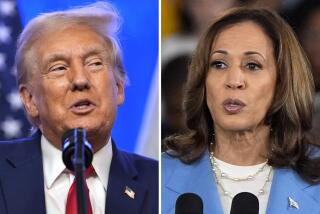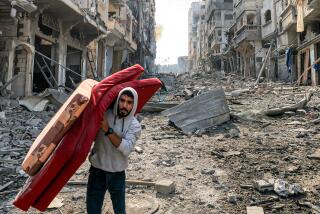White House Seeks U.N. Help to Revise Iraq Transition Plan
WASHINGTON — As President Bush met Friday with L. Paul Bremer III, the chief U.S. administrator of Iraq, officials said they planned to ask the United Nations to help devise a way to select a new Iraqi government that would be seen by its people as legitimate.
U.N. officials are under pressure from the Bush administration and its Iraqi allies to send a team of election experts to study the complex plan developed by the United States. Washington wants the team to assess the fairness of its plan to use regional caucuses to pick an assembly, which would choose an interim national government. Some Iraqi leaders have asked the world body to consider whether direct elections could be held by the June 30 deadline for transfer of power.
U.S. officials said they hoped U.N. Secretary-General Kofi Annan would dispatch the team within a few weeks. But they said Annan had made no decision and would wait to hear from Bremer and an Iraqi Governing Council delegation that will meet with him Monday in New York.
U.S. officials have been urging the U.N. to expand its role in Iraq, hoping that its imprimatur would increase Iraqi acceptance of the transition plan. Washington is particularly eager to tap U.N. expertise in drafting a new constitution, preparing for elections and possibly monitoring caucuses.
Annan and other U.N. officials have hesitated, concerned about security for their staff and reluctant to be seen as legitimizing the U.S. occupation.
“The meeting is really for the secretary-general to listen and see what [Bremer] has to say, and we’ll take it from there,” a U.N. official said. “We’re not there to give the seal of approval.... Whatever process is adopted needs to be fair and inclusive, and everybody needs to have a stake in it.”
The issue became urgent this week as an influential Shiite Muslim cleric, Grand Ayatollah Ali Sistani, increased demands for direct elections. Tens of thousands of Sistani’s supporters took to the streets in southern Iraq to protest the U.S. plan for caucuses and demand direct elections for a new Iraqi government.
Bremer, who flew from Baghdad to Washington for consultations before Monday’s U.N. meeting, met Friday with President Bush and senior administration officials at the White House.
After the meeting, he said that though U.S. officials and Annan had doubts that a fair election could be held by the June 30 deadline, “these are questions that obviously need to be looked at.”
Bremer insisted that Washington intended to stick with its basic plan in Iraq but was willing to think about “refinements” that might improve the process.
“There are, if you talk to experts in these matters, all kinds of ways to organize partial elections and caucuses,” he said. “We have always said we’re willing to consider refinements.”
U.S. officials have discussed various scenarios for creating “hybrid” electoral processes. One approach would combine caucuses with the direct elections that Sistani is demanding.
Another approach would be to expand the caucuses, giving a role to senior religious leaders who might then be willing to give their blessing to the process, a State Department official said.
Other proposals include using elections for “at large” candidates to choose some members of the transitional government while using regional caucuses to select others, sources said. Such an approach might produce a more diverse and representative body, they said.
U.S. officials as well as many experts worry that Iraq may lack the stability for direct elections.
“In general, you do not want elections to take place when there are still people running around with guns,” said Mark Schneider, a former Peace Corps director now at the International Crisis Group in Washington. In most peace processes that have unfolded around the world -- in Latin America, Cambodia and Afghanistan -- disarmament and demobilization have been seen as necessary precursors to free elections, Schneider said.
Until Iraq’s security conditions improve, the possibility of armed factions intimidating or even assassinating candidates remains a concern, he said.
U.S. officials acknowledged they were concerned that Sistani might issue a fatwa, or religious decree, denouncing the current transition plan.
“There’s a big fear about him issuing a fatwa ... that says, ‘We can’t work with this American-imposed process,’ ” an administration official said.
But some in the administration believe that Sistani is unlikely to do so, in part because of broad Iraqi and international support for a speedy transfer of power to the Iraqis.
“He has to at least show he’s being fair and open-minded,” an official said. “The problem is he clearly wants to make sure there are elections because the Shiites are likely to dominate, and he’s probably right.”
Sistani’s power was further demonstrated by the fact that this week’s protests were large, orderly and disciplined, noted Iraq expert Amatzia Baram of the U.S. Institute of Peace in Washington.
Sistani’s message, he said, is “I can be a good partner, I can play by your rules, but if you don’t cooperate with me, I can get nasty.”
That message was reinforced Friday by Sistani’s representative in the Shiite holy city of Karbala, Sheik Abdul-Mehdi Karabalie, who threatened more turbulence in Iraq if the U.S did not change its stance.
“The coming days will witness demonstrations, strikes and even confrontations with the occupation forces if they insist upon the imperialist schemes and painting the policy of this country in a way that serves their interests,” he said Friday.
Times staff writer Alissa J. Rubin and researcher Raheem Salman in Baghdad contributed to this report.
More to Read
Sign up for Essential California
The most important California stories and recommendations in your inbox every morning.
You may occasionally receive promotional content from the Los Angeles Times.











